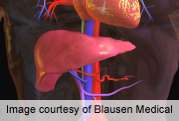Nonalcoholic fatty liver disease is independently associated with an increased risk of cardiovascular disease, but it is not associated with a statistically significantly increased risk of cardiovascular mortality, according to a study published in the June issue of Clinical Gastroenterology and Hepatology.
(HealthDay) -- Nonalcoholic fatty liver disease (NAFLD) is independently associated with an increased risk of cardiovascular disease (CVD), but it is not associated with a statistically significantly increased risk of cardiovascular mortality, according to a study published in the June issue of Clinical Gastroenterology and Hepatology.
To examine the association between NAFLD, CVD, and cardiovascular mortality, Maria Stepanova, Ph.D., and Zobair M. Younossi, M.D., M.P.H., of Inova Fairfax Hospital in Falls Church, Va., analyzed data from the National Health and Nutrition Survey III (1988 to 1994). The prevalence of CVD was assessed for 2,492 patients with NAFLD and 9,121 controls without NAFLD or other chronic liver disease. Independent predictors of CVD and cardiovascular mortality were evaluated.
During a median of 171 months of follow-up, the researchers found cardiovascular mortality in the cohort to be 3.76 percent. Compared to controls, participants with NAFLD were older, predominantly male, less likely to be African-American, and more likely to be Hispanic. Participants with NAFLD had an increased prevalence of all components of CVD and metabolic syndrome. After adjustment for major demographic, clinical, and metabolic confounders, there was an independent correlation between NAFLD and CVD, regardless of liver enzyme levels (odds ratio, 1.23). There was no statistically significant association found between NAFLD and cardiovascular mortality.
"NAFLD is associated independently with an increased risk of CVD," the authors write. "However, NAFLD did not increase cardiovascular mortality over a 14-year period."
More information:
Abstract
Full Text (subscription or payment may be required)
Editorial
Journal information: Clinical Gastroenterology and Hepatology
Copyright © 2012 HealthDay. All rights reserved.



















